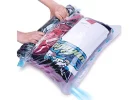Years ago I found that clothes stuffed in dry sacks end up in a jumble each time I try to find a specific item.
My solution is packing cubes, which I have used for years. They work perfectly with my backpack, which can be opened at the top like a dry sack or along the side like a suitcase.
I roll each item and secure it with a hair band. I can pull out the right packing cube, find the item I want without making a mess, and then return it to the backpack.
Three cubes (one large, two about half that size), designed to fit in a carry-on suitcase, fit perfectly in my backpack. I have them labeled for cIothing, safety/Covid/inflight, and glasses/electronics. I have two thinner cubes labeled for weather-related clothing and sleep system/bath/meds, with sleep and bath items, in turn, placed in smaller, brightly colored cubes from Decathlon.
Zip-lock bags have split at the neck after a couple of weeks on the Camino, so I use them only for items I need infrequently.
It occurs to me that if I needed to use compression bags to reduce the amount of space my clothing, for example, took up in my backpack, I should probably just eliminate some items. Rolling a plastic compression bag also creates some noise, so early-morning risers who pack some items in the morning would risk disturbing others in the dorms in the albergues.




















